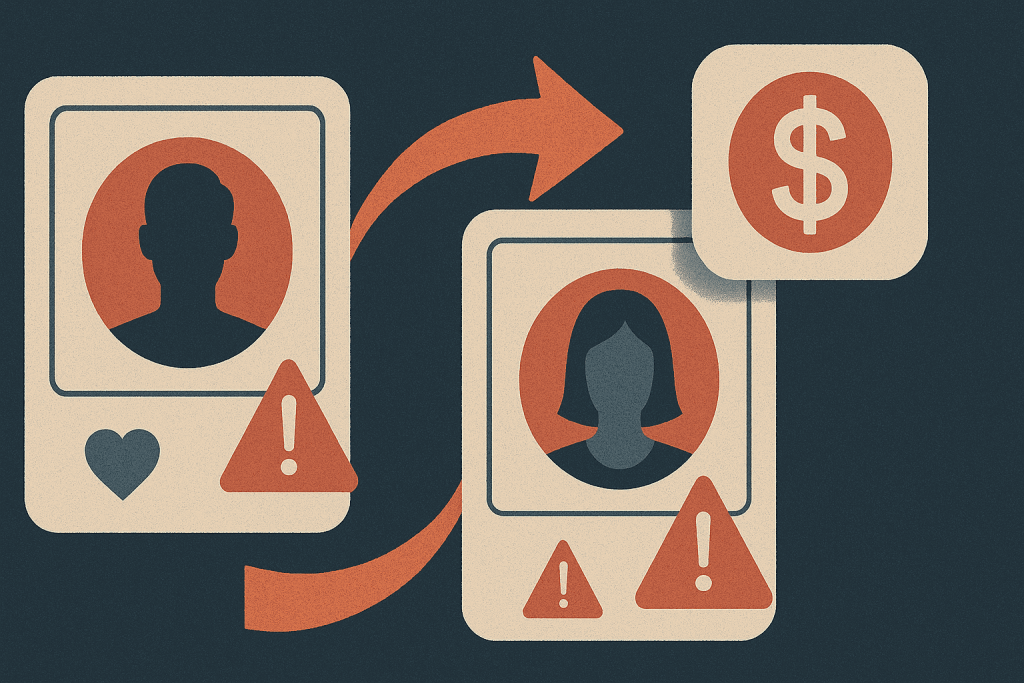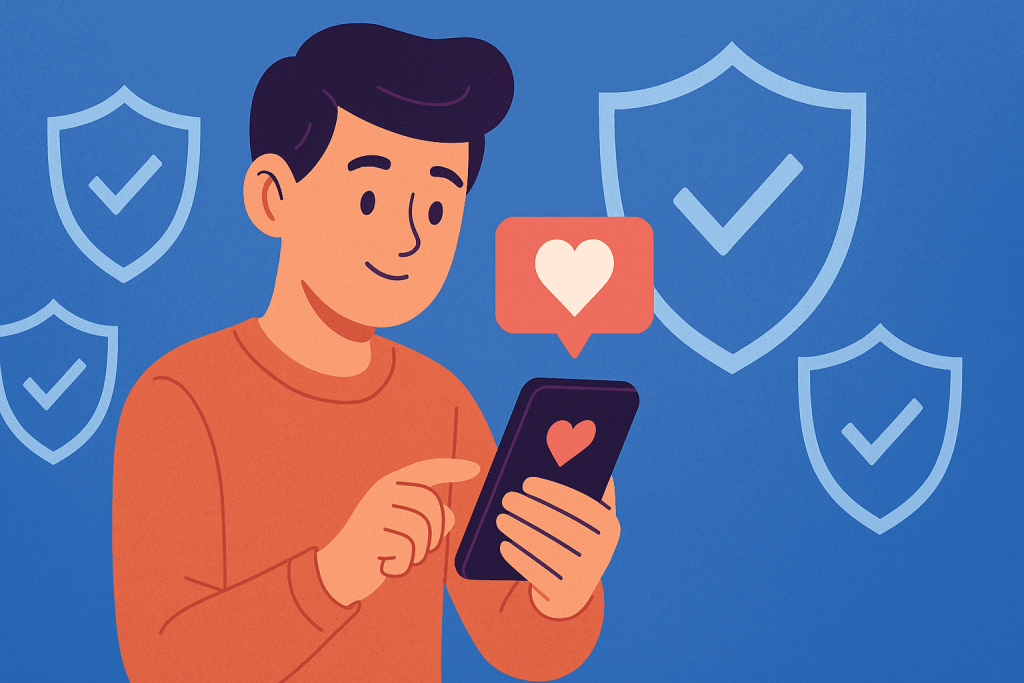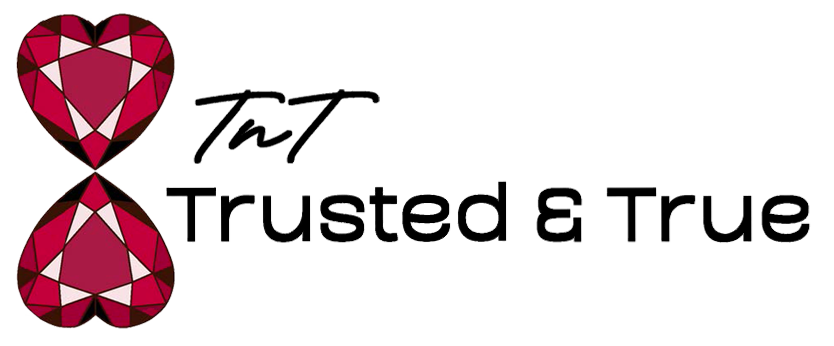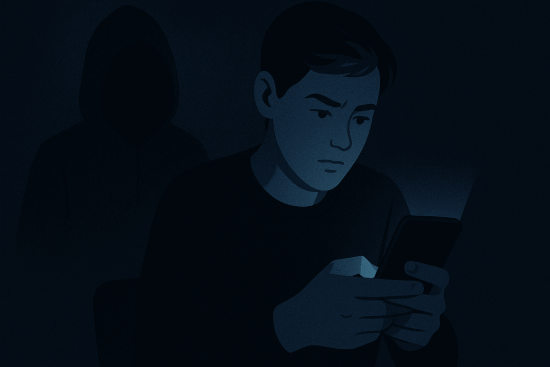It usually starts with a match that feels perfect. The late-night chats, the laughter, the emotional connection everything feels genuine. But then, a shift happens. Suddenly, your charming match makes a subtle threat or demand. What was once affection turns into online blackmail, and your trust becomes a weapon against you.
Online dating has connected millions, but it’s also opened a dangerous door for manipulation. From intimate photo leaks to emotional extortion, online blackmail is a rising issue and understanding it is your first line of defense.
What Is Online Blackmail in Dating?
Online blackmail is a form of digital extortion where scammers threaten to share your private information often intimate messages, photos, or videos unless you meet their demands, usually money or more content.
Common Examples of Online Blackmail:
- Threatening to leak personal or intimate photos
- Demanding money in exchange for silence
- Pretending to be someone else (catfishing) and using fake evidence
- Emotional manipulation guilt, fear, or shame tactics
These tactics are not just random they’re well-researched psychological traps designed to make victims panic.
The Rise of Online Blackmail: Why It’s Increasing
According to cybersecurity experts, cases of online blackmail have surged over the past three years, especially on dating apps and social media.
Here’s why:
- Anonymity online: Scammers can easily create fake profiles.
- Emotional vulnerability: Dating apps attract people looking for trust the perfect target.
- Easy access to private data: Photos, messages, and profiles are digital gold for criminals.
- Cryptocurrency payments: Untraceable money transfers make it easy for scammers to disappear.
Technology has made it easier to connect but also easier to exploit.

Scammer Tactics: How Online Blackmailers Operate
Most online blackmailers use a scripted method that starts innocently. They don’t ask for money right away instead, they build trust.
1. The Emotional Connection Phase
Scammers invest time in building rapport. They mirror your emotions, remember details, and pretend to care.
2. The Intimate Exchange
After earning trust, they subtly push for more personal information often intimate photos or videos under the disguise of affection.
3. The Threat
Once they have compromising material, the tone changes. They may say:
“If you don’t send $500, I’ll send these pictures to your friends.”
4. The Pressure Loop
Even after paying once, it rarely ends. Scammers continue to demand more exploiting fear and silence.
Financial Red Flags in Online Blackmail
Scammers are cunning they know how to manipulate emotions. Look out for these financial red flags:
- Sudden money requests with emotional excuses (“I need help for my sick mother”).
- Requests for cryptocurrency or prepaid cards.
- Unusual urgency (“I need it today or something bad will happen”).
- Promises of love or loyalty after payment.
Once money enters the picture, you’re dealing with extortion, not affection.
How to Spot Online Blackmail Before It Happens
Recognizing danger early can save you from emotional and financial damage.
Here’s how to spot potential online blackmailers before they trap you:
- They avoid video calls or make excuses not to meet.
- They rush intimacy and request personal media.
- Their profile feels too perfect stock photos, vague bios, unrealistic interests.
- They become defensive when asked for proof of identity.
- They pressure secrecy: “Don’t tell anyone about us yet.”
If someone online seems too good to be true, they probably are.

What to Do If You’re a Victim of Online Blackmail
If you’re already facing threats, don’t panic but do act wisely.
Steps to Take Immediately:
- Stop communication with the blackmailer. Don’t negotiate.
- Report the profile on the platform or app.
- Document everything screenshots, usernames, messages.
- Never pay the blackmailer. Payment encourages continued abuse.
- Contact local authorities or cybercrime units.
- In the U.S.: Report to the FBI’s Internet Crime Complaint Center (IC3).
- In other countries: Find your local cybercrime reporting portal.
- Seek support emotional manipulation can be traumatic. Reach out to trusted friends or online safety organizations.
Protecting Yourself from Future Online Blackmail
Prevention is your strongest defense. Adopt these digital safety habits:
- Don’t share private content with anyone you haven’t met in person.
- Reverse image search suspicious profiles.
- Use privacy settings to limit who can see your personal details.
- Trust your instincts if a conversation feels manipulative, end it.
- Stay anonymous early on don’t reveal your full name, workplace, or address.
In the world of digital dating, emotional intelligence is your armor.
The Emotional Aftermath of Online Blackmail
Victims often feel shame, fear, or isolation. But remember you are not to blame.
Online blackmailers are skilled predators who exploit trust and vulnerability. Talking about it helps others recognize the signs early.
Communities like Trusted and True are working to create a safer online dating environment where honesty and accountability replace deceit.
Awareness Is Empowerment
The more we talk about online blackmail, the less power scammers hold.
Digital love can be real but only when built on trust, not manipulation.
Stay alert. Stay informed. And remember no genuine connection will ever require fear, secrecy, or payment.
Trusted and True is the first dating platform truly dedicated to protecting users from online blackmail, extortion, and other digital threats. Your safety and peace of mind come first we’re here to help you date with confidence in a secure online space.
FAQs
What should I do if someone threatens to share my private photos?
Stop responding, document the evidence, report the account, and contact your local cybercrime authorities. Never pay or comply.
Can scammers really leak my photos online?
Yes, they can but authorities and major platforms can help you take them down. Reporting quickly limits damage.
How can I safely use dating apps without getting blackmailed?
Avoid sharing personal content early, verify profiles with video calls, and trust your instincts if anything feels manipulative.











